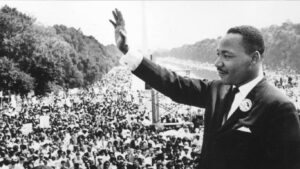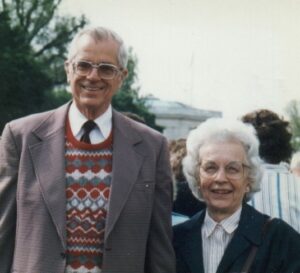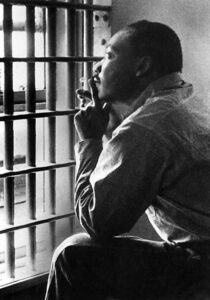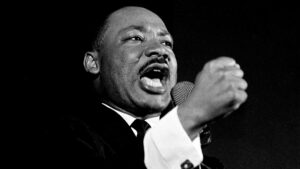 On August 28, 1963, Martin Luther King, Jr. spoke at the now-famous March on Washington. About two thirds of the way into his speech, he paraphrased Amos 5:24 when he said, “We will not be satisfied until justice rolls down like waters and righteousness like a mighty stream.”
On August 28, 1963, Martin Luther King, Jr. spoke at the now-famous March on Washington. About two thirds of the way into his speech, he paraphrased Amos 5:24 when he said, “We will not be satisfied until justice rolls down like waters and righteousness like a mighty stream.”
Amos the prophet, writing in 760 B.C., was the first to warn Israel of impending judgment and exile. His message to repent and “seek the Lord” was not heeded. Why? Because the leaders and people believed their show of religion and their promises to God were enough. However, their heart and personal righteous actions did not follow.
Amos declared, “Take away from me the noise of your songs, to the melody of your harps I will not listen. But let justice roll down like waters, and righteousness like an ever-flowing stream.” In other words, your actions do not match your profession. MLK, Jr. said as much in his “I Have a Dream” speech when he declared, “When the architects of our Republic wrote the magnificent words of the Constitution and the Declaration of Independence, they were signing a promissory note to which every American was to fall heir. The note was a promise that all men – yes, black men as well as white men – would be guaranteed the unalienable rights of life, liberty, and the pursuit of happiness.”
 I grew up in the 1960s. I was 10 when MLK, Jr. gave his speech. My father and mother watched it live. I was captivated by his oratory.
I grew up in the 1960s. I was 10 when MLK, Jr. gave his speech. My father and mother watched it live. I was captivated by his oratory.
I remember my dad, Arthur (who passed away at 98 in 2021), telling me the story of how he was raised by a Black nurse since his mother was confined to a wheelchair after his birth. No racial jokes were ever permitted in our home. My dad and mom always felt at home among the African-American community.
As John Piper has written from an evangelical perspective regarding MLK, Jr., “Leave aside his theological and moral flaws. He was used in the mighty hand of Providence to change the world so that the most appalling, blatant, degrading, public expressons of racism have gone away.” My mother and father would echo Piper’s sentiments, but would also agree that the sin of racism is still in need of repentance and forgiveness, and that those biblical truths MLK, Jr. spoke about still need to be rehearsed.
Martin Luther King, Jr. was born Michael King. When he was six, in 1935, his father Michael changed both his and his son’s name to “Martin Luther King” in honor of the famous leader of the Reformation, Martin Luther. King wrote, “As the Apostle Paul carried the gospel of Jesus Christ… so am I compelled to carry the gospel.” King was also inspired by Dietrich Bonhoeffer, who resisted the tyranny of Hitler. MLK, Jr. attended Booker T. Washington High School. It was Booker T. Washington who wrote, “I would permit no man, no matter what his color may be, to narrow and degrade my soul by making me hate him.”
Martin Luther King, Jr. echoed the biblical doctrine of civil disobedience. In his “I Have a Dream” speech, he declared, “In the process of gaining our rightful place, we must not be guilty of wrongful deeds. Let us not satisfy our thirst for freedom by drinking from the cup of bitterness and hatred…. We must not allow our creative protests to degenerate into physical violence.”
 In his “Letter from a Birmingham Jail” after being arrested for peacefully marching toward City Hall, he wrote, “One may well ask, ‘How can you advocate breaking some laws and obeying others?’ The answer is found in the fact that there are two types of laws: there are just laws, and there are unjust laws. I would agree with St. Augustine that ‘an unjust law is no law at all.’ …A just law is a man-made code that squares with the moral law, or the law of God. An unjust law is a code that is out of harmony with the moral law. To put it in terms of St. Thomas Aquinas, an unjust law is a human law that is not rooted in eternal and natural law.’”
In his “Letter from a Birmingham Jail” after being arrested for peacefully marching toward City Hall, he wrote, “One may well ask, ‘How can you advocate breaking some laws and obeying others?’ The answer is found in the fact that there are two types of laws: there are just laws, and there are unjust laws. I would agree with St. Augustine that ‘an unjust law is no law at all.’ …A just law is a man-made code that squares with the moral law, or the law of God. An unjust law is a code that is out of harmony with the moral law. To put it in terms of St. Thomas Aquinas, an unjust law is a human law that is not rooted in eternal and natural law.’”
Believers who desire to be true to Scripture would do well to heed both the “peaceful” resistance of MLK, Jr. as well as his biblical rationale as to why some laws can be resisted lawfully. Today our society has turned God-given, unalienable rights into mere “civil rights” granted by government.
 As Scott Powell has written, “It is hard to come to grips with… how the power, healing, and truth of his message can be overshadowed by today’s divisive and demoralizing philosophies of critical race theory (CRT) and diversity, equity, and inclusion (DEI). These divide rather than unite society. MLK stressed the importance of bringing people together through constructive dialogue and seeing all people as made in God’s image.”
As Scott Powell has written, “It is hard to come to grips with… how the power, healing, and truth of his message can be overshadowed by today’s divisive and demoralizing philosophies of critical race theory (CRT) and diversity, equity, and inclusion (DEI). These divide rather than unite society. MLK stressed the importance of bringing people together through constructive dialogue and seeing all people as made in God’s image.”
King declared, “I have a dream that my four little children will one day live in a nation where they will not be judged by the color of their skin but by the content of their character.” He went on to say, “This will be the day when all of God’s children will be able to sing with new meaning, ‘My country, ‘tis of thee, sweet land of liberty, of thee I sing. Land where my fathers died, land of the pilgrim’s pride, from every mountain side, let freedom ring.’”
So what lessons can we take from Martin Luther King, Jr. during this year’s “Black History Month?”
 The same gospel brought by the Pilgrim Church to Plymouth in 1620 can bring unity and harmony, and restore true justice and righteousness to our land today. However, it is clear that it must do so from believers who live out, from their heart, the true notions of applied Christianity where our profession is matched by our actions, for “righteousness exalts a nation, but sin is a reproach to any people” (Proverbs 14:34). We, as believers, must repent, for “judgment begins at the house of God” (1st Peter 4:17). We must truly seek the Lord earnestly, for “if my people who are called by My name will humble themselves, and pray and seek My face, and turn from their wicked ways, then I will hear from heaven, and will forgive their sin and heal their land” (2nd Chronicles 7:14).
The same gospel brought by the Pilgrim Church to Plymouth in 1620 can bring unity and harmony, and restore true justice and righteousness to our land today. However, it is clear that it must do so from believers who live out, from their heart, the true notions of applied Christianity where our profession is matched by our actions, for “righteousness exalts a nation, but sin is a reproach to any people” (Proverbs 14:34). We, as believers, must repent, for “judgment begins at the house of God” (1st Peter 4:17). We must truly seek the Lord earnestly, for “if my people who are called by My name will humble themselves, and pray and seek My face, and turn from their wicked ways, then I will hear from heaven, and will forgive their sin and heal their land” (2nd Chronicles 7:14).
God will bring forth His Kingdom, and He will use all kinds of people to do so. The true Church is the womb of the Kingdom (Matthew 6:10), bringing His love and values to the culture by being salt and light (Matthew 5:13-16). Throughout Scripture, God has used individuals that He has chosen, like a net, from the wider culture that surrounds the Church, to turn us back to Christ and His truth (Matthew 13:47-50).
Let us do so before greater judgment is needed in the days ahead to get our attention. As God transforms us from within, let us expect that He will “let justice roll down like waters, and righteousness like an ever-flowing stream” (Amos 5:24).







